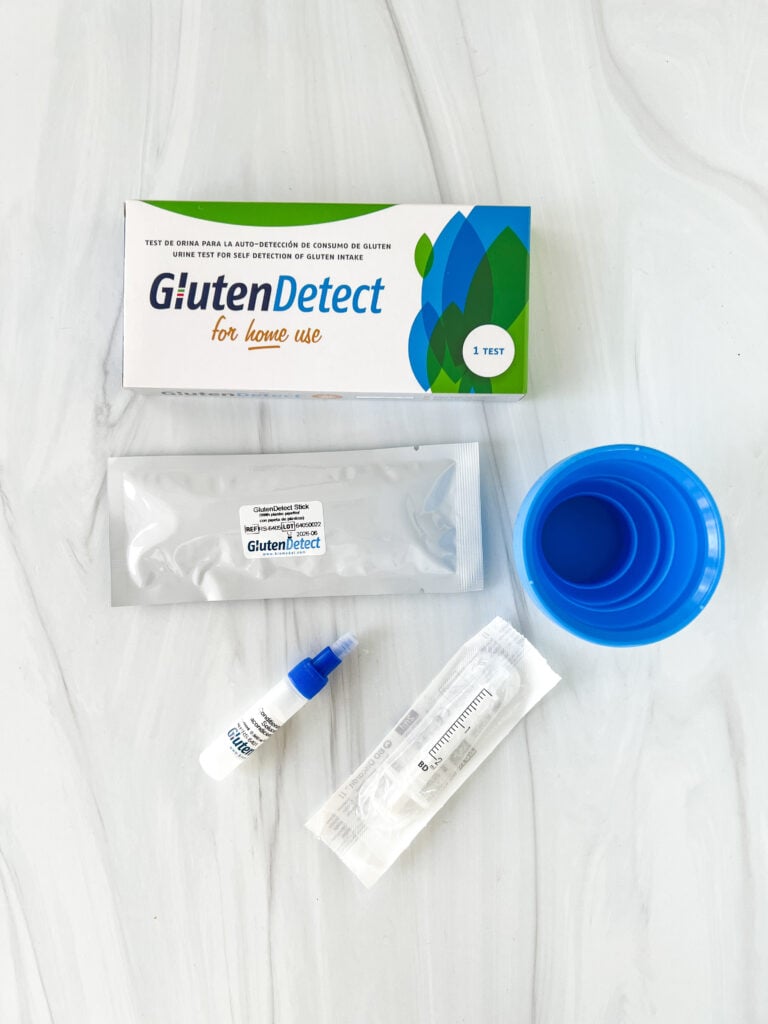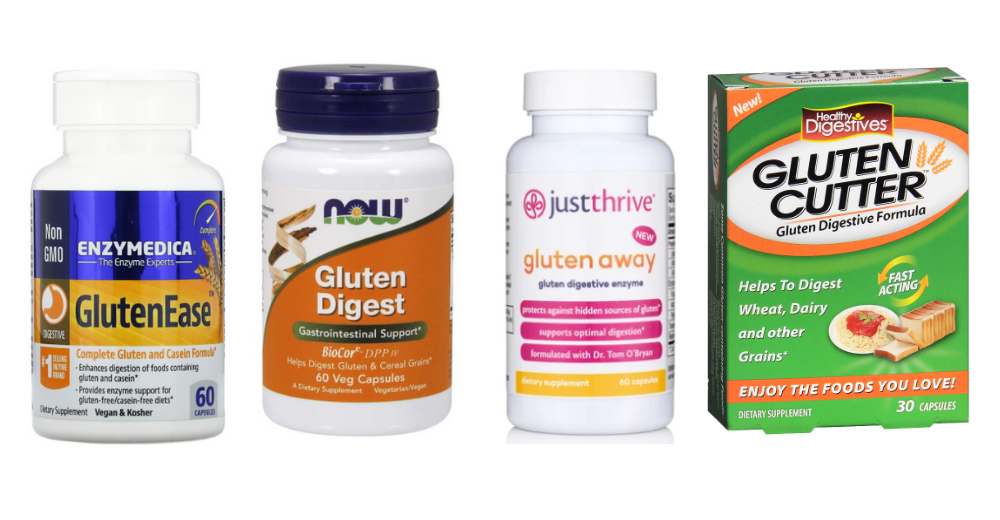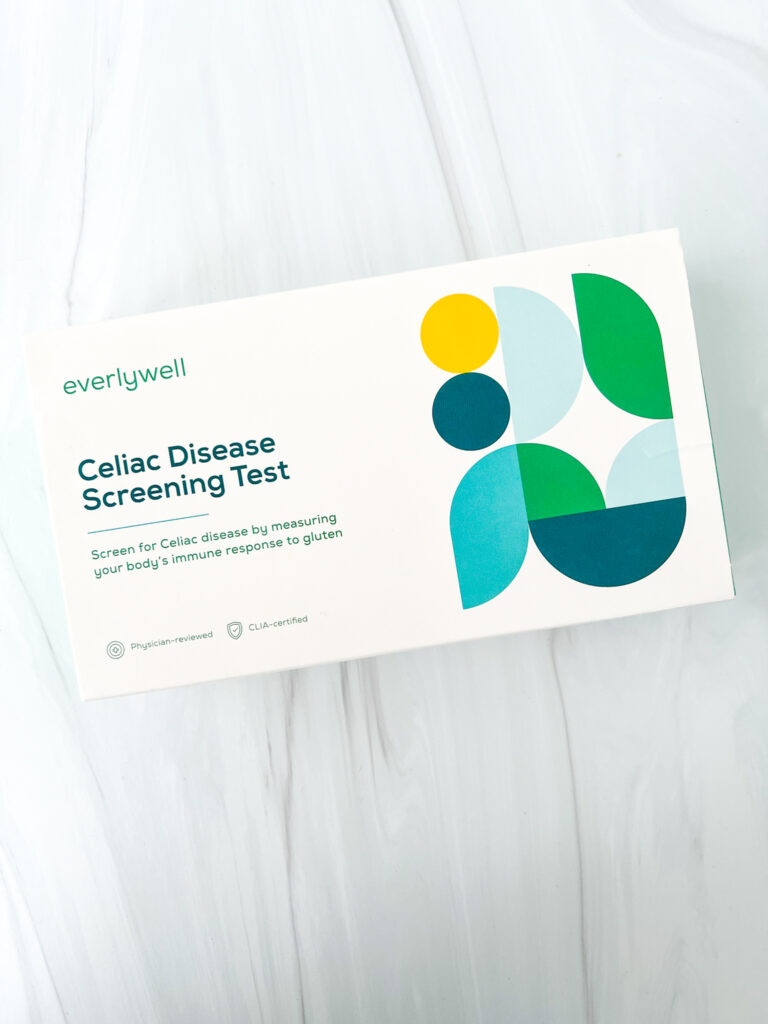
Getting glutened sucks. It can wreak havoc on your gut, mess with your entire digestive system, disrupt your immune system, and make you feel terrible. In this article, I discuss how long it takes for gluten to get out of your system after [accidentally] eating it. Please note this article is not a substitute for medical advice. This post contains affiliate links. Please see my disclosures.
If you’re one of the millions of people who have a gluten disorder, such as celiac disease, gluten intolerance, or non-celiac gluten sensitivity, or who are following a gluten-free diet due to an autoimmune disorder, wheat allergy, irritable bowel syndrome, or other food sensitivities or food intolerances, I have a feeling you’ve been accidentally glutened in your lifetime.
Maybe you ate something without checking a label, or a trusted restaurant caught you off guard and served you the wrong dish.
Maybe you fell victim to gluten cross-contamination from using a shared kitchen with roommates, or you unknowingly ate a hidden source of gluten by mistake.
Regardless, gluten happens, and when it does, it can hit you like a ton of bricks.
Most people know when they’ve been accidentally glutened because they experience digestive symptoms such as diarrhea, bloating, abdominal pain, and gas.
Others find that their joint pain, brain fog, migraines, rheumatoid arthritis, or irritable bowel syndrome symptoms return after eating gluten. Some even experience low energy levels, chronic fatigue, and/or a painful and itchy skin disorder known as dermatitis herpetiformis, an autoimmune disease commonly referred to as celiac of the skin.
There are hundreds of symptoms of celiac disease, gluten intolerance, and non-celiac gluten sensitivity. And as you can see, they don’t all involve stomach pain. (Read: 60+ Symptoms of Gluten Intolerance)
In this article, I’ll explore how you can tell when you’ve been glutened, how long it takes for gluten proteins to leave your body, and what you can do to build a more resilient gut and immune system so you’re better prepared for the next time gluten happens.
How Do You Know You’ve Been Glutened?
Gluten is hidden in many products that don’t look like they contain gluten. Soy sauce, yeast extract, salad dressings, licorice, and many other products contain gluten, even though they seem like they should be gluten-free.
While it’s important to read food labels before eating anything, foods like barley malt are not always disclosed on an ingredient listing in plain English.
Restaurants pose an even greater risk of gluten cross-contamination. An important study revealed one in three “gluten-free” restaurant dishes tested positive for gluten. That means if you like to eat out, chances are you’re eating gluten without realizing it.
While it’s hard to pinpoint whether gluten is to blame for your painful symptoms, there is one tool – an at-home test – that enables you to test your urine or stool for lingering gluten.
Gluten Detect makes at-home urine and stool tests that enables you to monitor gluten dietary compliance and detect gluten intake. The test looks for Gluten Immunogenic Peptides (GIP) in a person’s urine or stool.

GIPs are fragments of gluten that are resistant to digestion and are, therefore, eliminated in urine and stool. The presence of GIP in a person’s urine and stool is indicative that the person has recently eaten food containing gluten.
If you suspect you’ve been glutened, and you want to know for sure, I highly recommend keeping a stack of Gluten Detect tests on hand. You can learn more about this test, which is used by almost every celiac disease clinical trial, in my article, Gluten Detect Test (formerly known as Gluten Detective): A Review.
How Long Does Gluten Stay in the Body?
Once you know you’ve been glutened, you may be wondering how long it will take for it to leave your system. To understand how fast food moves through your body, you must first understand how digestion works.
Digestion begins in the mouth, where the mechanical (chewing) and chemical (digestive enzymes) work hard to break down your food.
The food then enters the stomach, where stomach acid will further break down food particles, delivering them to the small intestine to be distributed and absorbed by other systems in the body. In other words, the small intestine’s job is to feed all the other organs and cells in your body.
It typically takes six to eight hours for the food to pass through the stomach and small intestine before it enters the large intestine (colon) for elimination.
The Mayo Clinic researched the precise total transit time – from eating to elimination – and found that food takes an average of 53 hours to clear the body entirely.
Most of the transit time is through the large intestine (40 hours), although for women, it’s 47 hours, and men averaged 33 hours.
The transit time also will vary depending on several factors, including:
(1) The Type of Food Consumed: Some foods, like meats and proteins, are more challenging for the digestive system to process. Eggs, on the other hand, are considered one of the most bioavailable foods, which means your body can easily and quickly process and digest them.
(2) The Health of the Digestive System: Gluten damages the small intestine in people with celiac disease, inhibiting the essential organ from functioning correctly and throwing the entire digestive process into a tizzy. If someone with celiac disease continually eats gluten, chances are their small intestine hasn’t healed and isn’t properly functioning.
On the other hand, individuals with healed mucosal lining (lining of the small intestine) will likely bounce back quickly from a single gluten exposure.
(3) How Much Gluten You Ate: Digestive time also depends on how much gluten you consumed. Did you eat a small amount of gluten due to cross-contamination at a restaurant, or did you eat an entire wheat flour pizza? The more gluten in your system, the longer it may take for your digestive system to “process” it and for your body to recover fully.
How to Speed Up Recovery After Eating Gluten
As mentioned, the healthier your digestive and immune systems, the easier it’ll be to process, digest, and eliminate small amounts of gluten from your system.
On the other hand, someone experiencing chronic inflammation, intestinal permeability, or leaky gut will find it more challenging to recover from the same exposure to gluten.
The key to recovering quickly is to strengthen your digestive system and improve your overall gut health.
Here are some strategies to keeping things “running” smoothly (literally!) inside your digestive tract:
(1) Eat Plenty of Anti-Inflammatory Foods
There’s a reason they say an apple a day keeps the doctor away. It does, along with kale, spinach, broccoli, mushrooms, and many other fruits and vegetables.
These anti-inflammatory foods build immunity, stave off diseases, deter nutritional deficiencies, and strengthen your body’s defenses against digestive issues and immune system attacks.
Not sure of what to eat? Read these articles to help you get started:
- 10 Naturally Gluten-Free Foods Every Celiac Should Be Eating
- 200+ Foods You Can Eat on the Gluten-Free Diet
- 9 Meal Planning Tips for People with Celiac Disease and Gluten Sensitivities
(2) Chew Your Food
Digestion begins in the mouth. As you chew your food, your saliva creates a digestive enzyme called amylase, a chemical that helps to break down food and aids in digestion.
The combination of the mechanical (chewing) and chemical (digestive enzymes produced by your body) processes aid digestion and ensure the food you eat is properly broken down before it enters the stomach.
(3) Take a Digestive Enzyme
Many experts recommend taking a digestive enzyme before eating out because when you eat out, you’re most likely to accidentally consume tiny bits of gluten despite your best efforts to maintain a strict gluten-free diet.
Some digestive enzymes are specially formulated to help break down gluten and contain the enzyme protease, a digestive enzyme naturally produced by your digestive tract.
However, it’s essential to know that taking a digestive enzyme doesn’t give you permission to eat gluten; it only offers a little insurance if you get glutened.
They also don’t prevent an autoimmune response to gluten in people with celiac disease; rather, digestive enzymes only help queal the symptoms of an accidental glutening in some people with gluten disorders.
Learn more about how digestive enzymes work and which brands I recommend in this article.

(4) Mind Your Gut Health
I highly recommend talking to your doctor about taking a high-quality probiotic daily. I take 50 billion CFUs daily to help strengthen my gut with good bacteria.
You can also eat fermented foods, like lacto-fermented pickles and kombucha, to boost the good bacteria in your gut. For more tips on building a healthy gut, take my 7-day Heal Your Gut Challenge, read Dear Gluten, It’s Not Me, It’s You, or enroll in my SIGNATURE Gluten-Free Course.
(5) Eat Fiber
Fiber is essential to keeping food “moving” through your digestive tract. These 50+ gluten-free foods are high in fiber and will help add bulk to your stool and soak up toxins in your body.
(6) Eat Less Meat
Many people think eating meat is healthy, but I assure you, meat is not classified as a “health” food.
Rather, meat is an inflammatory, highly acidic food, that can sway your body’s delicate pH balance to slightly acidic, making your body ripe for disease. It contains little fiber and is difficult for your body to break down fully.
(7) Exercise
Walking after eating can help food move through your digestive system. In other words, gravity can help you digest better! Studies show that a brief 15-minute walk after a meal can aid digestion and improve blood sugar control.
(8) Avoid Sipping When You Eat
While you need to drink plenty of water, don’t do it while you eat. Your stomach acid works hard to break down the food you eat, but if you pour water on your digestive juices, you’ll put out the digestive “fire” needed to fully break down your food as it moves through your stomach.
(9) Drink Plenty of Water
Sip on water all day long. Water will help flush gluten and toxins from your body, contains zero calories, and it’s free.
Gluten Happens
As you can see, your body’s digestive tract is an amazing system that helps turn the food at the end of your fork into fuel every cell in your body needs.
While the only treatment for celiac disease and gluten intolerance is a strict gluten-free diet, unfortunately, gluten happens. When it does, make sure you’ve put in the hard work to heal and seal your gut so it can handle any small bits of gluten that come its way.
Additional Reading
Read What You Should Do When You Accidentally Eat Gluten for home remedies to soothe your inflamed gluten belly.
To learn how to go gluten-free fast and to fast-track the healing process, enroll in my SIGNATURE Gluten-Free Course.
Do you have celiac disease? This simple at-home blood test will help determine if you have the autoimmune condition. The test screens for two types of tTG antibodies – tTG-IgA and tTG-IgG – which are commonly found in celiac disease patients. Read more about what to expect when getting tested for celiac disease.

You might also enjoy these articles:
- Does Gluten Intolerance Increase After a Gluten-Free Diet?
- What Happens If You Eat Gluten With Celiac Disease?
- Supplements for Celiac Disease and Gluten Intolerance
- Do Digestive Enzymes for Gluten Work?
- The Benefits of Probiotics for Celiac Disease
- Why the “Gluten-Free Heart Disease” Study Is Dead Wrong
- 12+ Must-Read Books about Celiac Disease and Gluten-Free Living
- What is Gluten and Why is it Bad for Some People?
Hello, I found a contradictory information regarding water and meal. Quote: “In fact, drinking water during or after a meal helps how your body breaks down and processes food (digestion).” From Mayo Clinic here: https://www.mayoclinic.org/healthy-lifestyle/nutrition-and-healthy-eating/expert-answers/digestion/faq-20058348
“Water is free”?? In what world? You are either paying the city for water hook up, paying for installation of a well and maintenance for the pump or buying water from a store – especially true in places where the tap water is not safe to drink! Water is not free!
My Functional MD says gluten remains in your body for approximately A YEAR AND A HALF!!… It’s supposed to be digested and completely out in a couple DAYS or so and purged out of the body *but its been messed with scientifically so many times over so hangs out for an extended stay in our bodies. This is why everyone has some sort of inflammatory reaction to it, from simple weight gain etc etc to chronic fatigue etc hypothyroidism etc or all of the above plus more. Personally, I now consider it man made, just like plastic. It’s truly a disgusting abomination that Big Food plays God.
I’m on a combination of multiple binders (in a single product) for mycotoxin toxicity. It’s an all in one product that has most major binders: black charcoal, chitosan, zeolite, bentonite clay, etc etc. I take extra ASAP when I’ve been glutened, and also take ozonated olive oil capsules or hemp oil capsules (double the strength of olive oil) daily to lessen the digestive as well as overall effects of my many digestive woes. I also find that plain black charcoal powder works to mitigate and dampen gluten explosion.
I just got glutened during a family gathering and feel like 💩💩💩. I feel all y’all’s pain! I’ve been lying down like I’m suctioned to the bed. It’s blowing over but I did take extra binder powder as soon as I got home. I’m now going to down a 💩-ton of water with ozonated oil caps. Unfortunately for me, drinking a ton of water doesn’t do much. If I could afford to (or was living anywhere in Europe), I’d go get an ozone 10 pass stat tomorrow for a more thorough detox and repair.
Best of luck, I’m proud of you all for hanging in there. The world is a sick and dirty place and we’re just reacting to it. Don’t let anyone think it’s “just you”!
I wasn’t aware gluten can cause such a severe reaction in my body !! Earlier I used to eat 7 chapatis . One night I started feeling uneasiness and vomitted blood !! Thanks to doctor who healed me. Again I eated chapati suddenly allergic reactions occurs rashes were on my skin !! Then I started to figuring out why this is happening with me . I searched articles on internet and found I’m allergic to gluten .
I get stomach ulcer about 15 days after eating gluten, and even after a month I am struggling with it.
There is some research that suggests that if you have slow gut motility you might not want to take probiotics as they sit too long in the small intestine and lead to SIBO. Could be that spore based probiotics won’t do this but I haven’t read anything about that.